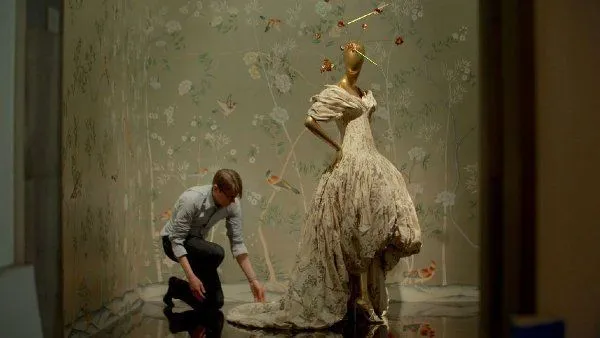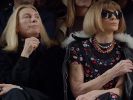Eye For Film >> Movies >> The First Monday In May (2016) Film Review
The First Monday In May
Reviewed by: Anne-Katrin Titze

The Tribeca Film Festival's brilliant choice to have the World Premiere of The First Monday In May as its Opening Night Gala selection was a signpost to how good this year's program is turning out to be. Andrew Rossi's grand documentary on The Metropolitan Museum of Art's Costume Institute China: Through the Looking Glass exhibition, curated by Andrew Bolton with The Grandmaster director Wong Kar Wai as Artistic Director, takes us on a journey to faraway lands of fantasy and fabric. This is an extraordinary and insightful chronicling of the process which allows the work to be visible. Rossi's behind the scenes look reveals many levels in regards to stamina, both physical and intellectual.
"Let's pretend the glass has got all soft like gauze, so that we can get through," says Lewis Carroll's Alice, and like her, you lose control as the enchantment kicks in. "Why, it's turning into a sort of mist now, I declare."

No other fashion exhibit has made me contemplate the construction of time quite like this. Centuries and continents separate some of the garments you thought were twins. Guo Pei's blue and white evening gown, Rodarte porcelain silk crepe, Mainbocher jacquard, a cheongsam from the 1930s and one by Marc Jacobs for Louis Vuitton, a satin robe from 18th century China, Dries Van Noten dragons, a 1920's qipao, and Margiela's metal beads mingle so naturally that it is impossible not to surrender to their allure.
Karl Lagerfeld, Chanel Haute Couture, the House of Dior and John Galliano, Giorgio Armani, Alexander McQueen, Isabel Toledo, Valentino, Jean Paul Gaultier, and Ralph Lauren imagine "chinoiserie" in their own ways, from the Anna Wintour Costume Center on up through the Egyptians to the Chinese galleries on the second floor.
The film unfolds like a thriller. A beautiful one where the moon in the water needs to be trusted. The make-believe stereotype of a "Lotus Blossom" or "Dragon Lady" and the image created around Anna May Wong and its influence are challenging. In lieu of ignoring an imaginary, mysterious Orient as politically incorrect, China: Through the Looking Glass and The First Monday In May take a good look at cinema and fashion's fascination with it.
Anna Wintour, Condé Nast Artistic Director and Vogue Editor-in-Chief joins Bolton, who is now Curator in Charge of the Costume Institute as our regal guides to show us the genesis of the largest undertaking for a fashion exhibition in The Met's history and how she and her staff work to achieve the glamorous Costume Institute Benefit Gala.
We witness the opening of crates at The Met, one of which includes a spectacular gown from John Galliano's China-inspired Spring 2003 collection for the House of Dior and hear the designer talk about the "mystery" and his complete awareness that the sense of "danger" in the Oriental dress is a product of early Hollywood film depictions and has little to do with any lived reality. Which is precisely the theme of the show and another obstacle Bolton and Anna Wintour have to overcome. On a trip to Beijing to promote the exhibit, Vogue and The Met have to defend themselves.
For those who are living with a 19th century idea of what art is, dismissing fashion as trivial and frivolous, Bolton counters that sometimes "fashion is easier to understand than language itself." Colleagues at The Met need to be convinced that the production design will not turn the permanent Chinese collection and their galleries into "Disneyland" or an "amusement park" and they express worry about accusations of racism that could be leveled against them. The show addresses these issues with Edward Said's work on Orientalism prominently featured right at the start of the exhibit in the Anna Wintour Costume Center.
China: Through the Looking Glass has become the most successful adventure in the history of the Met's Costume Institute, topping even the blockbuster Alexander McQueen one.
In The First Monday In May, Andrew Bolton visits the Fondation YSL in Paris, marveling at the Mondrian dresses and other pieces in their archive that are "unquestionably works of art." Rossi likes to show Bolton walking, wearing the cut of pants and jacket made famous by his partner Thom Browne. The clothes evoke someone still growing, evolving, never standing still and above all, curious.
During a decor meeting at Wintour's house for The Met Gala, hosted every year by her and Vogue, where the biggest stars rub exquisitely clothed elbows, Baz Luhrmann is fully engaged. Looking at a design drawing for the festivities, she asks: "Isn't this based on a Chinese something?" Luhrmann, without missing a beat, responds. "It's the something part I'm worried about."
We see Rihanna rehearsing before her performance during the Costume Institute Benefit and the arrival of the stars in party mode. Contemporary Chinese designer Guo Pei, who also dressed Rihanna for the ball, says she felt "as if I were making a wedding dress for my country."
André Leon Talley, with his wit and charm on display during his red carpet interviews, sums it all up best by likening it to the Super Bowl that takes "months and weeks and weeks and months" to prepare in every little detail. And Wong Kar Wai notes: "The only way to move forward is not forgetting your past."
Reviewed on: 14 Apr 2016















